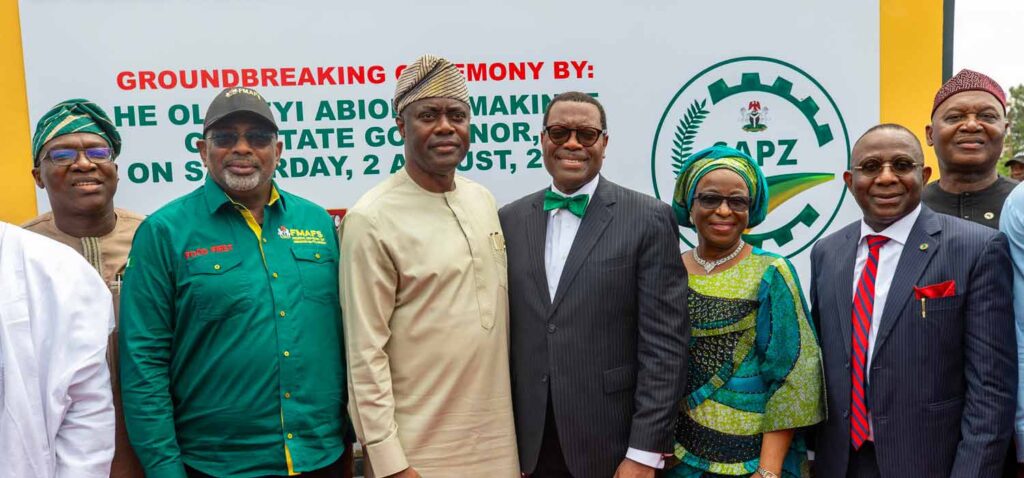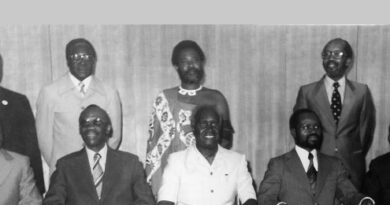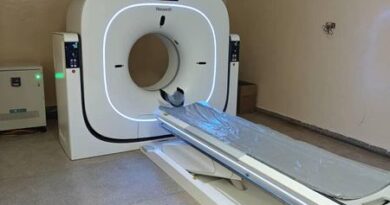Nigeria Expands Agro-Industrial Footprint with Launch of Special Processing Zone in Oyo State
Nigeria has inaugurated a major agro-industrial development with the groundbreaking of a new Special Agro-Industrial Processing Zone (SAPZ) in Ijaiye, Oyo State, aimed at accelerating agricultural transformation, job creation, and rural industrialization. The site marks the third SAPZ in Nigeria and the first in the southwest region, following earlier developments in Kaduna and Cross River States in April 2025.
The ceremony, held on Saturday, August 2, was attended by national and international dignitaries, including the President of the African Development Bank Group (AfDB), Dr. Akinwumi Adesina, who was making his final official visit to Nigeria in his role as head of the Bank. Also present were Oyo State Governor Seyi Makinde, Nigeria’s Minister of Agriculture and Food Security Senator Abubakar Kyari, and senior representatives from development partners and the local farming community.
Dr. Adesina emphasized that SAPZs are central to the AfDB’s “Feed Africa” strategy, which he launched in 2015. The zones are designed to connect agricultural production to value-added processing, logistics, and global markets, thereby increasing earnings for farmers and creating sustainable livelihoods.
“I believe that Nigeria can and must be a global powerhouse in agriculture,” said Dr. Adesina. “But you need investments and industrial platforms that link what farmers grow to how it is stored, processed, and exported. That’s what SAPZs are about, turning agriculture into wealth.”
The Oyo SAPZ spans 3,000 hectares, with 300 hectares designated for immediate development. It is expected to host up to 40 agro-processing industries, generate over 100,000 direct and indirect jobs, and benefit at least 500,000 farmers.
The SAPZ program is financed by a $538 million investment from a coalition of partners, including the African Development Bank, the Islamic Development Bank, the International Fund for Agricultural Development (IFAD), and Nigeria’s federal and state governments. It currently covers seven Nigerian states and the Federal Capital Territory.
Governor Seyi Makinde hailed the project as a fulfilment of his administration’s promise to industrialize the state through agriculture. “Today is about promises kept,” he said. “This hub links producers to processors and farms to markets. Agriculture is not just about food, it’s about infrastructure, enterprise, and national development. We are building a future where agriculture sustains not just families but entire economies.”
Representing Vice President Kashim Shettima, Minister Kyari described the SAPZ initiative as integral to President Bola Ahmed Tinubu’s Renewed Hope Agenda. “The SAPZ initiative embodies the spirit of partnership that drives our national transformation,” he said. “It’s about restoring dignity, unlocking potential, and creating opportunity for every Nigerian.”
David Olatunji, Chairperson of the Ijaiye Farm Settlers Association, said the launch marked a “memorable opportunity” for the community. “We have a lot of unbroken forests, and the farmers are ready to work,” he declared.
Dr. Adebowale Adeyeye, an agripreneur specializing in soybean and cashew processing, said the SAPZ would reduce operational costs and attract long-term investments. “With targeted government support in areas like power, roads, and security, the SAPZ creates the enabling environment we need to scale up operations and build competitive value chains.”
Reflecting on his 10-year tenure as AfDB President, Dr. Adesina highlighted major milestones, including the Bank’s capital increase from $93 billion in 2015 to $318 billion in 2024, and its repeated recognition as the most transparent multilateral development bank globally.
“The export of raw commodities is the door to poverty. The export of value-added products is the highway to wealth,” he said. “SAPZs are how we unlock that value. Our goal is to reduce post-harvest losses, improve infrastructure, and lift millions out of poverty.”
He outlined three pillars essential to SAPZ success: political will, resource mobilization, and strategic partnerships. “What we are witnessing here in Oyo would not have happened without intense collaboration at all levels, government, financiers, and the community,” he noted.
Dr. Kabir Yusuf, National Coordinator of SAPZ Nigeria, announced that the program would be expanded to 10 additional states from September 2025, beginning the second phase of the initiative aimed at nationwide coverage.
The SAPZ model is currently being implemented across 28 sites in 11 African countries, with Nigeria hosting the largest and most ambitious rollout.
Dr. Adesina was accompanied by senior AfDB officials including Dr. Abdul Kamara, Director General for Nigeria; Prof. Oyebanji Oyelaran-Oyeyinka, Senior Special Adviser on Industrialization; and Richard Ofori-Mante, Director of Agricultural Finance and Rural Development.



